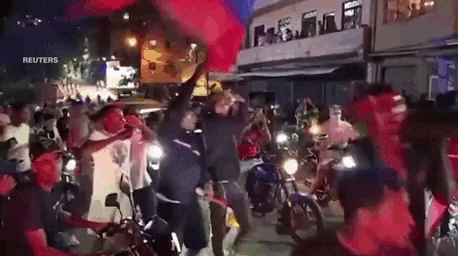Maduro’s last minutes, Edmundo Gonzalez, demonstrations and more

Protests, allegations of fraud and more. This is what you need to know about the situation in Venezuela

Opposition leader Maria Corina Machado (right) and presidential candidate Edmundo Gonzalez (left) hold a press conference after Nicolas Maduro was declared the winner of the election, in Caracas, Venezuela, July 29, 2024. (Credit: Matias Delacroix/AP)
Opposition leaders denounced alleged irregularities this Sunday while the votes were being processed and counted.
According to the opposition, its witnesses were denied access to the headquarters of the National Electoral Council (CNE) during the vote count; their presence was supposed to ensure transparency and fairness.
Only a very limited number of election observers were allowed to monitor the voting. They included the Carter Center, which called on the CNE to publish the results of polling stations, saying this information was “fundamental to our assessment.”
The United Nations was also in attendance, and a spokesperson said later that U.N. Secretary-General Antonio Guterres called for “full transparency” and for the electoral body to “carry out its work independently and without interference to ensure the free expression of the will of voters.”
The opposition also denounced that the CNE had blocked the sending of data from polling stations to the central body, thus preventing more votes from being processed.
The government has previously been accused of rigging the vote, which it denies. Maduro’s government controls almost all state institutions, including the CNE, which was accused in 2017 of manipulating voting data by a software company that provided voting technology. The CNE had previously denied the claim.
CNN contacted the CNE for comment on Monday. The body has not yet addressed the opposition’s allegations.
How do Venezuelans react?
Although Maduro’s supporters celebrated his victory in parts of Caracas, there were widespread opposition protests on Monday.
Hundreds of people marched through the streets in Caracas waving Venezuelan flags and chanting “Freedom!”
Videos from across the country, from Charallave to Cacaguita, show crowds banging pots and pans, making noise so loud it can be heard from far across the city. This Latin American practice is known as cacerolazo, a form of spontaneous protest.
A CNN crew saw dozens of National Guard troops in riot gear suppressing the mostly peaceful protests with tear gas and batons.
“We want peace for Venezuela, for our families,” one protester, who preferred not to be identified, told reporting teams on the ground.
González and Machado have called for the protests to continue this Tuesday.
Maduro on Monday condemned the protests, saying his government “knows how to face this situation and defeat the violent.”
He also claimed, without providing evidence, that most of the protesters were hate-filled criminals and that they were planned in the United States.
For Venezuelans, this is all too familiar territory. Previous periods of opposition protests have been met with harsh repression by the police and military, who have a long history of protecting the Chavista system, including in 2017 and 2019.
